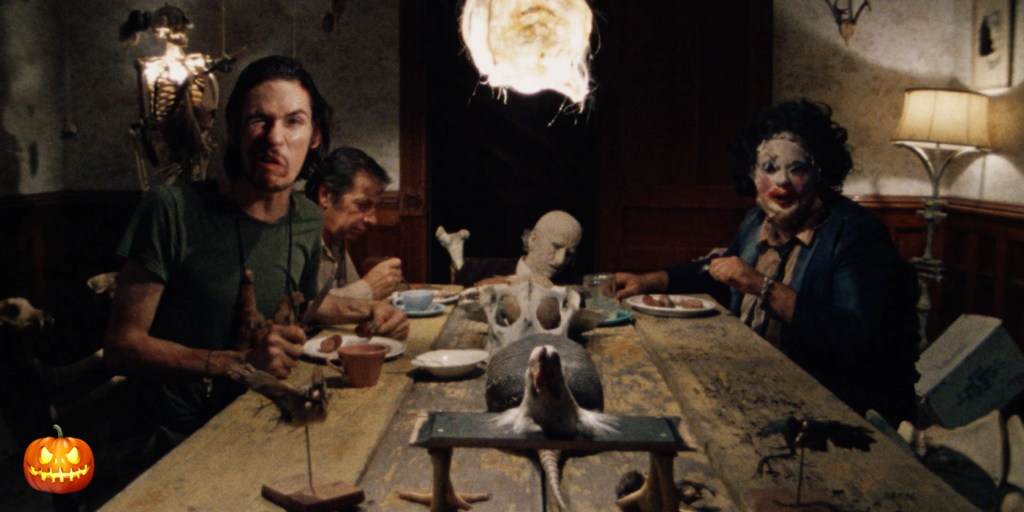The road to Halloween is paved with good films. Wherein we countdown to the spirited season with a hundred doses of horror. 79 days to go.
Released in 1974, The Texas Chainsaw Massacre was a low-budget film that is now a much-loved horror classic. It really is one of those films that – if you admit to not having seen it – is met with blank stares and general outcry. It’s the cornerstone of the modern slasher; it’s tagline brazenly asking, “Who will survive and what will be left of them?”.
There are eight Texas Chainsaw films in total, with reboots, remakes and sequels thrown into the mix. But there really is nothing quite like the absurd thrill of the original. It’s a film that is utterly relentless in its pursuit – a true adrenaline rush, if ever there was one.
“It’s more about what you can hear, off-screen, or the psychological impact of being chased by a man swinging a chainsaw.”
Originally banned in the UK by the BBFC, the film is a horror staple for lovers of the genre. Despite the suggestive title, this is a film that – in comparison to others rated 18 – is relatively low on gore. It’s more about what you can hear, off-screen, or the psychological impact of being chased by a man swinging a chainsaw or being forced to have dinner with his equally cannibalistic “family”.
The film stars Marilyn Burns as Sally, who sets out with her brother (Paul A. Partain) and her friends to visit her grandfather’s old farmhouse only to discover that there are crazed murderers. Including Leatherface himself (Gunnar Hansen), now living next door. And guess what? They’re in need of their next kill.
Whilst Tobe Hooper does adhere to some horror tropes – for example, teenagers out on a road trip; exploring a seemingly abandoned house; or tripping over tree roots while being chased – the film is ground-breaking in the fact that most of the murders take place during the day. Daytime, or sunlight, in horror is typically some sort of code for “safe” – but not here.
Like Alfred Hitchcock’s Psycho, the film is said to be inspired by the Wisconsin serial killer, Ed Gein. And this is clear in the set decoration, whereby Leatherface’s house is accessorised with skin and bones and meat hooks hang empty, waiting for his next victim.
“Watching it, you do feel like you can smell the stink of flesh in the air.”
Tales of the film’s shoot are now legendary. Directed on virtually no budget by Tobe Hooper, the cast and crew were subjected to searing heat, which caused the props (including animal bones and blood) to rot and melt. The lack of funding also meant that no costume changes were provided – meaning days of sweat and fake blood were matted into the actors’ get up, causing flies to start to swarm around the set. By all means, it was not a pleasant experience – which perhaps adds to the performances on screen. Watching it, you do feel like you can smell the stink of flesh in the air.
The image of Leatherface twirling his chainsaw above his head is perhaps the most recognisable from the film, but, for me, the stand-out scene is the one around the dinner table. It’s surreal and frightening, like being trapped in a nightmare you can’t wake up from. Burns character writhes and screams as the cannibals around her decide her fate. It’s so intense, you’d be forgiven if you forgot to exhale. The image of the animal bones on the table; Leatherface’s worn-out mask; and the grampa propped up at the head of the table is positively haunting, without adding in all the shrieking and threats.
The Texas Chainsaw Massacre still stands up to this day and is not blighted by outdated effects or corny acting. It’s a film that is very much still frightening as it – quite literally – buzzes with energy and frenzy. It has given us a horror icon in Leatherface and is a must-watch at Hallowe’en (or just whenever you need a good scare).

